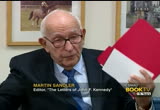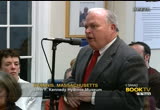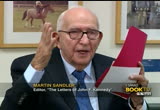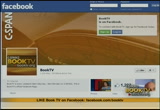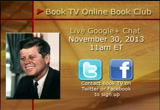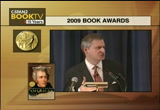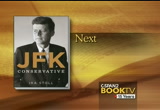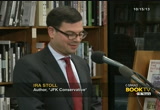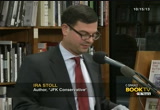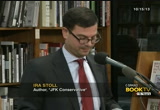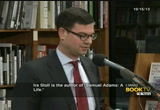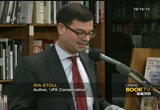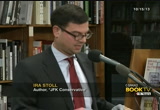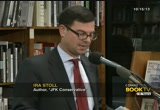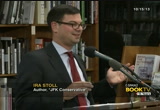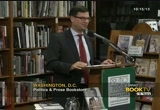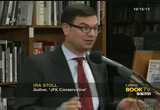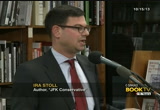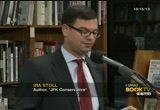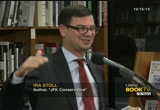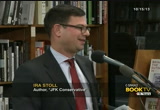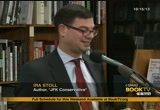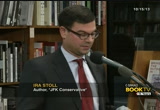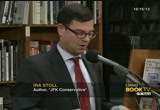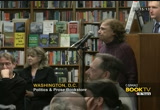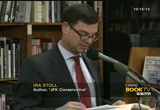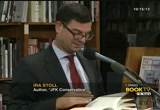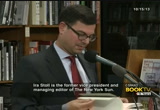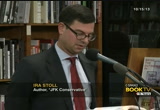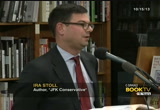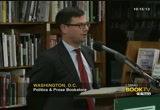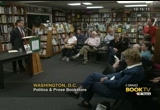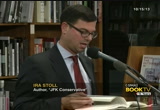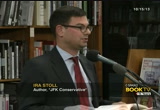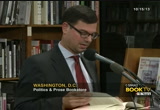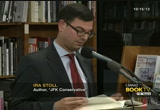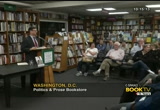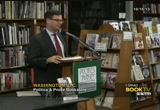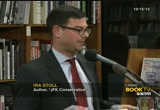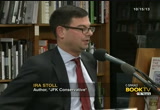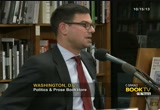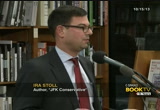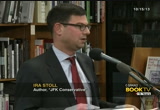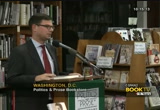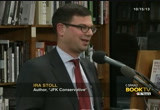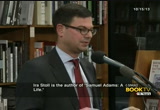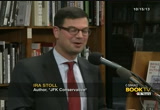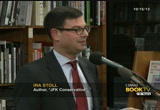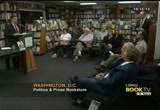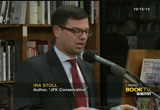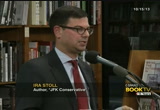tv Book Discussion on JFK Conservative CSPAN November 16, 2013 2:40pm-3:31pm EST
2:40 pm
one. and we printed out the handwritten ones and it's very hard to read them sometimes. >> another question? and a baby to do than to wrap it up, just to get your impressions and the documentary will be out this month on the discovery channel and your book on the letters of jfk and one of the archivist from the presidential library and this includes the difference in the presidency is in the correspondence of presidents over the years, it has changed so much. and there will be so many fewer letters coming forward for an historians to look after them
2:41 pm
one of you can talk talk about the impact of that. and how it is being written today. >> you will not happen down the line, because they get through and a stipend, you know, and by the time that our grandkids are going, they will talk into their watch and have a meeting instantly. you know, who knows what will be. but we can say for sure is that you don't get e-mails, but you get what is in the library and you don't get on twitter what you get from the library. and i have written for histories of photography and when we went to digital, we lost a lot and it made it a lot this.
2:42 pm
and so we concentrate on this and it's brilliant. >> that's a great impact. >> thank you so much for joining us this evening. thank you to the viewers on c-span. for those of us at the museum, copies of the book are available for purchase and autograph is provided by books by the sea. marty, we thank you so much. it's so great to have you. >> thank you. [applause] [applause] >> booktv is on facebook. you can like us or interact through guests and viewers and watch videos and get up-to-date information on events,
2:43 pm
facebook.com/booktv. >> november 22, 2013, the 50th anniversary of the assassination of president john f. kennedy. and several books that have been published to mark the event. for this month's booktv bookclub, we want to know what book you are reading. join other readers to discuss the books published this year in good booktv.org and click on the club to enter the chat room. when they are, check out the resources that we have posted, including book reviews and videos from the booktv archives and you can log in as a guest or through your facebook or twitter account. and then join us on saturday, november 30, at 11:00 a.m. eastern for a live chat to discuss books on the 35th president and contact us via facebook to sign up for the live chat.
2:44 pm
>> this fall is booktv's 15th anniversary and this weekend we look back at 2009. the national book award for nonfiction that your went to tj stiles for his biography of cornelius vanderbilt and the 2009 high outcries or the history of the great depression and the forgotten man. the pulitzer prize for a biography went to johnny jim and his account of the presidential tenure of andrew jackson. his book was discussed in 2008. >> i began this book five years ago. partly because it was the period in which david mccullough's john adams was doing so well and and benjamin franklin by will drive that captured the popular imagination and my sense was that if we were going to go back and recover these early figures, we should recover someone who represents the best of it in the
2:45 pm
worst of it. and andrew jackson surely does that. he teaches as much by vices as he does by virtues. so this is not -- you can't really have anything other than it works with andrew jackson. but they are on a man who ultimately kept the possibility of progress alive by preserving the union. >> over the next few weeks, booktv is much all the programs online at booktv.org. >> we continue with the recognition of president kennedy's assassination in 1963. up next, ira stoll argues
2:46 pm
kennedy's buildup of the military during the cold war and his free trade and tax cuts to bolster economic growth is examples of the president ideologies on the conservative side. "jfk, conservative" is his book and this is just under one hour. >> thank you for having me. when i first arrived in washington come as august 1995. and my friend lived near here let me stay on his couch until i found a place of my own. and he was quite kind to offer me his couch for an open-ended period of time and he was quite generous and he or his roommates were not quite so kind to give me the key to the house.
2:47 pm
and i often had some time to kill in that lovely august weather before he got home from work. and we have a distinguished crowd with other authors here and other newspaper men and women as well. ms. account people here in the event had friendship had friendship that lasted more than 20 years and my parents are here and my brother and sister-in-law are here. and i want to particularly thank jonathan lugar and ann, they also make contributions to the book and i thank them. but enough about me, about the bookstore, and about the other people here. let's talk about president kennedy. today is saying ira stoll makes
2:48 pm
the case that jfk was a conservative. i do argue in this book that by the standards of his time in our own, john kennedy was a conservative to cut taxes and tariffs and the strain domestic spending and wanted to reform welfare and built up the military and conceded to the cold war pressures against what he considered the godless soviet union. but i'm not just being modest when i say that i think the strongest arguments in this book are when the book begins with congressional candidate on july july 19 only six in which he spoke of the right of the individual against the state and christian morality. he said that america's basic religious ideas were being challenged at home and in the cynical philosophy of many of our intellectuals and abroad in
2:49 pm
the doctrine of collectivism. and i mentioned kennedy's 1950 speech at notre dame in which he won the ever expanding power of the federal government and the absorption of many of the functions that faith and cities once considered the responsibilities of their own, they must now be a source of concern to all those who believe the irish patriot controls over local affairs and the essence of liberty. there was 1955 speech at the assumption college in my hometown of massachusetts, where he said about the cold war that i believe religion itself is at the root of the struggle and not in terms of the physical organizations or christianity versus those of atheism, but in terms of good versus evil and right versus wrong. and in his remarks during the
2:50 pm
campaign at the tabernacle in salt lake city, where he said the enemy is a communist system itself, insatiable and unceasing in its drive for world domination, it is also a struggle for supremacy between conflicting nato ologies, freedom under god versus godless turning. in kennedy's famous lines in the inaugural address, the same revolutionary beliefs for which we are still at issue around the globe. coming not from the generosity of the state, but from the hand of god. we shall pay any price and bear any burden and meet any hardship and support any friends and oppose any foe to assure the survival and success of liberty. and ask not what your country can do for you, but ask what you can do for your country.
2:51 pm
and in december 1962 he said it are two choice is not between tax reduction on the one hand and the avoidance of large federal deficits on the other. it is a paradoxical truth that tax rates are too high today and tax revenues are too low and dishonest way to raise revenues in the long run is to cut the rates now. and that is not to encourage the budget deficit but the expanding economy which can bring a budget surplus. and okay, you can say that frederick. but what about actions? it passed the house in september of 1963 and it became a law. and kennedy did increase military spending while maintaining restraint on domestic expenditures and they did cut tariffs on imports using the trade negotiating authority
2:52 pm
that he had with congress and he escalated the war in vietnam and he stood down the soviets in berlin and in cuba and he pointed a supreme court justice who wrote the dissent in roe versus wade. and people may ask why should we care whether kennedy was a conservative young usual partisan motives of claiming a popular figure for our side. and after all, he has been dead for 50 years and the soviet union is gone and tax rates are now lower than they were during the eisenhower and nixon administration when the marginal rate was 91%. and i do think that many of the issues can be dealt with like economic growth and free trade and peace through strength are still with us today and that his policies can be a guide. and i know we have a bipartisan audience here. so i want to lead with a the take away of kennedy principles on leadership.
2:53 pm
in the first is to get a wide spectrum of advice. this was true with kennedy on two of the key issues, cuba and taxes. there were kennedy advisers who said, do nothing, after all, americans would be just as dead if nuclear missiles were launched from cuba as if they were launched from russia. and adelaide stephenson made exactly that argument as well. and so did other less stereotypical liberal kennedy advisers, like george bundy. in other advisers, like the air force general basically advised him back to the stone age and so kennedy got this full range of advice from do-nothing to launching an attack on cuba. and on the tax cut, kennedy was
2:54 pm
careful to get advice not just the people who favor the tax cut, but from those who oppose it as well. and ambassador to india came back and met with kennedy at the white house. tbyte kennedy in writing on taxes, as usual, i would oppose a tax cut instead of increasing federal spending. and albert gore, senior. also speaking to kennedy about the tax issue and there is a great scene in my book at eleanor roosevelt's funeral, it's not just a book by leibovitz. our town has this great scene at the tim russert you know what everyone is doing their own business at the funeral in a kind of modern washington way and the same thing was happening at hyde park at eleanor roosevelt's funeral and al gore
2:55 pm
senior kind of just cornered him and said that he was talking about the tax cut. and dwight eisenhower was standing in the corner trying to say hello to his successor and he couldn't even although his way into the conversation. and then on the airfield, where the two men were returning to washington, kennedy sent for him and was on another plane and had him right back continue the conversation. that is a first kennedy rule of leadership. once you decide, the decision is made.
2:56 pm
and well, you guys, you won. presidential me to shut up about it. >> there are newspaper headlines about al gore denouncing the kennedy tax cut as a bonanza for fat cats. and there is a tape of kennedy denouncing al gore senior as a son of a gun. and so get a wide spectrum of advice and the third thing, kennedy leadership principles, i discern that you need to stick to your principles. there's a myth out there, i think propagated by a few liberal historians. kennedy underwent a sort of liberal conversion in the final months of his administration after he gave a speech at
2:57 pm
american university and i write in the book that that's the distortion and it's not only a distortion of the chronology. because after the speech, kennedy went to berlin and anyone who thinks that it's possible to work with the communists, let them come to berlin. and even jacqueline kennedy and they dismissed it as nonsense. >> kennedy, at the beginning of the book, he is giving a speech about how the individual in these rights come from god and they are going to be challenged by the soviet union and this is all the way through the end of the year and through his
2:58 pm
presidency. and we are coming up on november, it's going to be the 50th anniversary of president kennedy's assassination and in doing the research for this book. i went to visit his home in massachusetts is kind of a testament to the fiscal spending restraint because of the birthplace is only open about april or may through october or november. so the government doesn't have to pay to keep the whole house. and it can also hire the tour guides as park rangers as seasonal employees. so doesn't have to pay them full-time benefits. and they don't have to go through the civil service hiring system. and the student who took me around and said that he was a
2:59 pm
seasonal employee, he said that if it were year-round, they would all be veterans because they get priority in the civil service system, not that there's anything wrong with that. and i was there, and there is a gift shop in the basement there in the book had been sent to the gift shop for a review. but have not made the cut as part of a permanent inventory there a couple of kids there and i picked one of them up and read it with my daughter in the afternoon after a rejoinder and
3:00 pm
3:01 pm
and continuing through president reagan here in virginia, doing his training for the 1980 presidential debate and the virginia hunt country for force retreat, which he had rented for the 1980 campaign. and kennedy invoked jfk tax cuts and the jfk foreign policy and he said repeatedly whenever i talk about president kennedy, my opponents tear their hair out and going through president bush who also invoked kennedy for his foreign policy. you could argue whether there
3:02 pm
were accurate representations or not so i think that that is part of the greatness and the tragedy of kennedy that even though the tragedy is because he's not dead, it is something you can only speculate on what he would've been on these questions. but the greatness is that everyone is still trying to figure it out for two years later. and so i think that the best words that can capture that are actually that kennedy was a great reader of poetry and there was an elegy which included the line of what he was, he was, what he is slated to become depends upon us.
3:03 pm
and so with that, i'm happy to take your questions. [applause] [applause] >> i am a liberal from newton, massachusetts, which is what most people were when i was growing up. >> kennedy, the conservative, did he feel that half the people were takers and people were living doll and all that stuff that people talk about? >> that is a terrific question him and i write about welfare and the book and there is some surprising stuff there. i actually credit kennedy with
3:04 pm
3:05 pm
welfare recipients to work. i'm recommending a change in the law to permit states to maintain with federal financial help community work and training projects for unemployed people receiving welfare payments. under such a program, unemployed people on welfare would be helped to retain work skills or learn new ones and obtain additional manpower on public projects. sounds like mayor giuliani's work fair be program. in signing into law the public welfare amendments of 1962, kennedy spoke of a new approach stressing services in addition to support, rehabilitation instead of relief and training for useful work instead of prolonged dependency. so, you know, and i also have a bit toward the end of the book about robert kennedy who's, you know, often seen as being more liberal than jfk, and robert
3:06 pm
kennedy campaigning in 1968 in kokomo, indiana, quote: we've got to get away from the welfare system and the idea of the dole. we've got to have jobs instead of welfare. >> still not quite welfare queens. but thank you. >> thank you. >> good evening. hopefully, that's working. so kennedy, of course, had some ambitious health care reform plans that he never was able to enact. could you speak to how his health care reform ideas connect with your argument for him as conservatives? >> sure. so the idea of medicare had been around, and, you know, it was kennedy proposed it. and he did it framed in very, in very conservative language, and i'll find that for ya.
3:07 pm
it was funny, he also -- this connects to the welfare point where, um, where he said, he proposed this medicare plan as very modest proposal, cut to meet absolutely essential needs. and with sufficient deductible requirements to discourage any malingering or unnecessary overcrowding of our hospitals. this program is not be a program of socialized medicine, it's prepayment of health costs with absolute freedom of choice guaranteed. every person will choose his own doctor and hospital. the program's a sound one and entirely in accordance with the traditional american system of placing responsibility on the employee and the employer rath or than on the general taxpayers to help finance health costs. so even as proposing this big government program, he's aware with this language about malingering about the risks of
3:08 pm
perverse sniffs. and i think -- incentives. and i think, you know, schlesinger writes that liberals within the administration were disappointed that in 19 62 instead of making a big push for medicare he chose to make trade, tariff negotiation authority the main priority with congress. and, you know, kennedy got some stuff through congress. he got the trade promotion authority. he made a big push on taxes, and he got that through the house. and, you know, part of what an administration does is choose priorities. now, maybe in a second term if he had won it, he would have decided he was going to make medicare a priority, but, you know, he didn't live that long, so we don't know. but i think that's, that's a accurate summary of the case on medicare anyway.
3:09 pm
>> that's a good answer. and if i may follow up just briefly, do do you not think tht part of the argument he made for medicare in that speech and similar to the welfare response you gave, do you not think he's perhaps making that sort of language, that sort of argument to sort of get conservatives' support for his arguments? of course, at the time saying the appearance of anything socialist whatsoever was just poison, so of course he wouldn't say, no, we're moving away from socialism, of course we're not wanting to do this. so do you think that might have been just a way to try to get the message out to get more conservative support? >> yeah, i think that's a fair point. but the rhetoric, the rhetoric was defensive or the rhetoric was designed to appeal to people who weren't his natural base, those are all fine arguments, but the fact remains that he didn't get it done. and that people who served with him said they were disappointed
3:10 pm
that he didn't make it his priority. and it was his choice about what to make a priority. he gave, you know, five or six speeches about the tax cut in prime time on television, at the new york economic club, to business groups. he did not give five or six speeches about medicare. maybe if he did, it would have passed. >> thank you. >> hi there. so kennedy, though, self-identified as a liberal. he said he was a proud liberal. and he was hated and despised by many conservatives. so i'm wondering if what we're dealing with here is more of a question of terminology in the changing nature of liberals and liberalism. i mean, the number one book in america on "the new york times" bestseller lists the weekend he was about to be killed, it was all about how he was a secret communist. so i'm not quite sure what you mean by the words "conservative"
3:11 pm
and "liberal" in this respect. >> yeah, so sure. i talk about in the book about how the meaning of those terms have changed over time. but it's also true that kennedy was interviewed and said i'd be very happy to tell them i'm not a liberal at all. that was kennedy in an interview with the saturday evening post many 1953. the quote -- so, yeah with. so there's this claim that there was a conversion, and i think part of it may relate to what the previous questioner asked about, trying to win over people who aren't your natural base. and that speech where you mentioned where he said, you know, it's okay to call me a liberal, i talk about that for a couple of pages in my book. it was a speech to the liberal party of new york in the 1960 election. now, the liberal party of new york is a sort of special
3:12 pm
creature. it had broken off from a socialist party over communism. that was an anti-communist party. and, you know, kennedy framed that very carefully. he said, well, if a liberal means this, that and that, it's okay to call me a liberal. on this, that and that, you know, you can -- i don't have it at my fingertips here, but look in the book, it's carefully framed. and other people -- and it's true there were conservatives at the time who did not like jfk. but there were conservatives at the time who did like jfk. a lot of those southern democratic governors endorsed him partly on the race issue. those were not people who liberals at the time were a big fan of. the certain conservatives at the time, william f. buckley was a
3:13 pm
big fan of the kennedy tax cut. other conservatives didn't get it. they thought it was going to increase the deficit. >> announced, though, for being someone who was pushing for civil rights. so it seemed like these people like certain parts of him, they don't like other parts of him. they liked the economic policy, today thought he was weak because he didn't bomb cuba. it seems to me there's a whole lot of balls up in the air here. >> and, well, the liberals -- >> so conservative strikes me as, like, you're picking and choosing just certain things here. >> well, again, i think the best argument for that is not, it's not my words, but kennedy's words and the words of the people who served with him. and, again, not just from the early '50s, but from, from after kennedy died ld. and, you know -- died.
3:14 pm
and, you know, i quote some of them in the introduction to the book where, um, where ted sorenson, kennedy was a fiscal conservative. in fiscal matters, he was extremely conservative, very cautious about the size of the budget. sorenson made a similar point in a november '83 "newsweek" article saying he never identified himself as a liberal. he was more conservative than any president on fiscal matters. kennedy's treasury secretary, douglas dillon, described the president's speech at financially conservative. another washington columnist, the thing that's very important to remember about the president was that he was not in the most marked way, he was not a member of the modern democratic liberal
3:15 pm
group. this is from a 1964 interview. he had real contempt, i'm afraid is the right word, for the members of that group in the senate or most of them. what he disliked -- and here, again, we have we've often talkt it -- was the never getting anything done liberalism. this viewpoint was completely foreign, and he regarded it with genuine contempt. he really was contemptuous is the right word for it. he was contemptuous of that in american life. the great success my administration had with an intelligent, active but in my opinion conservative policy. >> i grant you that. i don't want to monopolize that, but are there also 101 quotes then of conservatives talking how much they loved kennedy many in your book? >> well, the reagan chapter, yeah -- >> that's from the '80s. i'm talking about in the 1960s. >> well, in the 1960s, the
3:16 pm
republican party was dominated, was dominated by richard nixon who wrote in his memoirs that during the 1960 presidential debate kennedy successfully convinced tens of millions of viewers that he was to the right of me on communism in cuba. >> all right. >> could you give us a definition of liberal and conservative then? maybe the same today? and the real question is liberal then, conservative today. >> yeah. well, that's a hard question for another book by some political scientist. i mean, i write in the beginning of the book that there was an article in some political science journal that went on for about 25 pages on the question of defining what a, what a liberal meant and a conservative
3:17 pm
meant -- or, no, what was liberalism in the 950s, political science quarterly. and the author finally punted: above all we must resist the temptation to resist 1950s liberalism to a simple idea. there's a similar argue by a columbia professor about conservativism in the '60s, he pointed out that conservativism includes many ideas that often -- including many that contradict each other. so, you know, i think for the purposes of this book i grew up in the 1980s, and conservativism was tax cutting, and it was strong military and a robust foreign policy, peace through strength. and a kind of respect for tradition on social issues
3:18 pm
influenced by religion. free trade. so -- and undergirded by the idea that people have god given rights that come from, or natural rights that are not created by the state or the government, but that we all have. and so whether those are classical liberal ideas or conservative ideas, i think those were kennedy's ideas, and, you know, they're ideas i think are probably shared by a lot of americans who who may call themselves centrists or don't put themselves into categories of liberal or conservative. a conservative word is, if i can confess, it's a bit of an attention-grabbing title. but if i could put all the
3:19 pm
things i just said on the title of the book, i would do that. [laughter] >> thank you. >> wouldn't your -- i walked in late, so maybe you addressed this, but wouldn't it also underpin and underscore the point that you're making if you look back at the 1960 campaign and how successfully kennedy alleged that there was a missile gap which -- and that eisenhower, the eisenhower administration enabled this missile gap to occur, and that was apparently one of turning points in the '60 campaign, it would seem to reinforce that same point that you're making. and i wondered if in your book you made any reference to that. >> yeah, i mean, i have a whole chapter on the 1960 campaign. one of the things i haven't talked a lot about here is kennedy's catholicism. and the stick to your principles department, i mean, there were
3:20 pm
other politicians at the time who had been born catholic and switched, they converted to protestantism, the governor of new jersey. so the catholic issue was a big issue in the 1960 campaign, and part of the chapter is about how kennedy handled that. but the other two big issues in the 1960 campaign, one of them was economic growth, and that was, that was kennedy attacking the eisenhower/nixon b administration for not creating enough economic growth. and related to that, the cost of the lack of economic growth wasn't just domestic in that there were not enough jobs, but it was, it was international in that we were losing ground to the soviet union in this global competition. and, yeah, the military was definitely a part of that, and nixon was kind of maneuvered
3:21 pm
into promising that if he was elected, he was going to spend more on the military. but he had been b vice president for eight years, so it was a little bit awkward. and for sure, kennedy was talking about the missile gap and, you know, there are articles that have since come out saying it was phony, that, in fact, the -- america had a big military edge at the time. but they still went ahead can and built a lot more nuclear weapons. and partly -- that was a choice for economic development. i mean, there was a proposal for big public works and stimulus-style nest you can spending program -- domestic spending program. but kennedy said, well, the way he was going to do the spending was through the military, and that was a way to get support for it from the democrats in congress. >> thanks. i want to say for me personally
3:22 pm
you've made your case really well, despite the fact that kennedy was a successful democrat and probably in most people's eyes certainly to the left of barry goldwater with. [laughter] that just for the sake of completeness could you sort of recount his history with civil rights, which we all know partly but i don't feel totally, that i totally know his overall sort of feelings about things and what he was sort of drawn into and what he really accepted with gusto in terms of his civil rights positions. >> yeah, sure. well, civil rights was a little bit like medicare many that at the beginning -- in that at the beginning kennedy certainly didn't make it a priority, and he came late to it. it's a mixed record. i don't want to -- there have been books out, there was a book with the title "bystander," you know, that really was very harsh
3:23 pm
on kennedy about civil rights. and i think in a way it's unfair to impose present-day standards on him, but he did get elected with the support of a lot of these southern governors. so just to name a few real, admirable, i hi, accomplishments of -- i think, accomplishments of kennedy on civil rights, he did appoint thurgood marshall to the second circuit who won the brown v. board of education decision, and i actually have -- there's this great anecdote in my book that i collected as a reporter of the new york sun at the dedication of the thurgood marshall courthouse in new york where the judges of the second circuit were gathered for a photograph, and there was some problem with the flash equipment. marshall showed up a little bit
3:24 pm
late for the photograph, and the photographer said, oh, gee, i thought you were the electrician when he showed up. and marshall handled it really well. he said, oh, do you think i could get a job as a union electrician? because, you know, the racism at that time wasn't just in the south, it was in the new york city trade unions. there's a really, i think, touching story after medgar evers who is a field secretary of the naacp and was shot in his driveway when his young children saw him die, he was buried at arlington, and kennedy invited the children to the white house after the funeral and spent some time with them which was, i just
3:25 pm
think, really sad. and then, of course, he sent federal agents in to integrate some of the southern universities over the opposition of the southern governors. so i think all that stuff is heroic. on the other hand, he didn't really propose civil rights legislation until 1962, 1963, and he didn't really push as hard for it as some people think he should have. and his whole approach to civil rights was really more of, i think, a grass roots approach than a legislative approach. there's a scene in the book, you know, people think of the white house tapes as something that happened under nixon, but really the white house taping system was installed, was operating under kennedy. so we have all these, this great evidence. and there was a meeting after the march on washington between
3:26 pm
kennedy and these civil rights leaders. and how does the meeting start? not by kennedy saying, oh, how can we work together to pass new landmark civil rights legislation, because he was afraid that was going to derail the tax cut which he thoughting anyway would do more to help blacks by growing the economy. but he said to them, gee, you know, why can't you guys be more like the jews? there were a people who were discriminated against and managed to educate themselves and, you know, why can't you be more like that? you know, when you think about it, it's incredibly pay to are nicing. -- patronizing. it might have been good advice -- [laughter] but unless, you know, you actually heard it on the tape, you wouldn't believe it. and then after this meeting he went out to the rose garden with martin luther king and said, you know, you've really got to get rid of those communists who are in your, who are in your inner
3:27 pm
circle. so, and king had written articles in the nation denouncing the kennedy approach on human rights as essentially cautious and defensive. so it's a mixed record. and i think it's, that's how i would sum it up. >> so i wounderred if you could touch just a bit on johnson. caro seems to paint a picture of this guy who's haunted by kennedy's death, he's burdened by some of kennedy's policies, but he also wants to advance some of them, and he may want to use kennedy for his own purposes. or the memory of kennedy. and what are your thoughts on sort of how lyndon johnson factors into how we view kennedy today? >> well, i'm not a johnson expert, but there's a couple of interesting bits in the book about johnson. the first is that when he was picked as vice president, the liberals were outraged. they saw him as a southerner and
3:28 pm
a gradualist on civil rights. so some of the union guys, the head of the united autoworkers, there was a mini rebellion against kennedy. a lot of those guys would have preferred stephenson anyway. so at the convention when johnson was picked, there's this famous saying where kennedy almost had to uninvite, uninvite johnson to be vice president. part of that was because of this uproar among the liberals. but later on i think you see johnson emerging as more of a liberal figure, at least on domestic policy. and there's another scene in book where johnson after kennedy had been shot meets with walter heller who's a liberal kennedy economic adviser and tells heller, you know -- tells heller
3:29 pm
to, you know, come up with a plan for war on poverty and says, you know, kennedy, to be honest, he was a little conservative for me. now, one of the historians who read this book before-published, a johnson specialist said, well, you know, there's tapes of johnson saying to businessmen, you know, kennedy was a little liberal for me. so i don't know whether it's evidence of the conservativism or the liberal itch of johnson or the essential political nature of all these old decisions. but i think what johnson did in terms of escalating vietnam and increasing dramatically domestic spending along with some tax increases is just different from what kennedy did. he came from a different background. obviously, he grew up poor as opposed to kennedy who grew up with houses in hyannis port and
3:30 pm
palm beach and an apartment at the carlyle in new york and private schools, ivy league colleges all the way through. so, you know, they just came at it from different angles and, you know, you can't know what would have happened in that second term if kennedy had lived. but my guess is that you wouldn't have seen as big a domestic spending program as we got under johnson just because he had, you know, he had had a first term, and there was, there were just very few signs of it, if any. >> hi, ira. >> hi, kate. >> so my question for you is i'm curious what you think the formative influences were for jfk's conservativism. and i know you mentioned his catholicism which is, obviously, probably a big one. and you also mention his, you know, personal wealth and his backgr.
106 Views
IN COLLECTIONS
CSPAN2 Television Archive
Television Archive  Television Archive News Search Service
Television Archive News Search Service 
Uploaded by TV Archive on

 Live Music Archive
Live Music Archive Librivox Free Audio
Librivox Free Audio Metropolitan Museum
Metropolitan Museum Cleveland Museum of Art
Cleveland Museum of Art Internet Arcade
Internet Arcade Console Living Room
Console Living Room Books to Borrow
Books to Borrow Open Library
Open Library TV News
TV News Understanding 9/11
Understanding 9/11